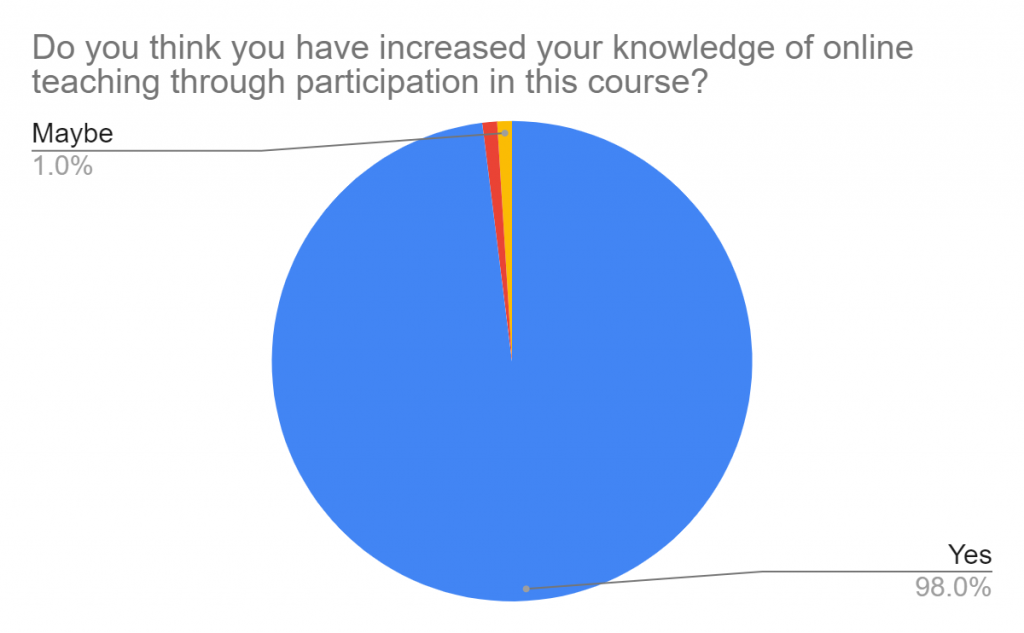9. Conclusion
The #Openteach project has had significant impact on the professional learning of educators at a number of levels: at a local university level, at national and international level, see table below for details of the projects impact as of May 2021.

Impact on #Openteach course participants
Following the first course run, we conducted an evaluation study to explore and understand participants learning experiences of the course. An evaluation report was produced called The Openteach Pilot Evaluation Report (Farrell, Brunton, Costello, Donlon, Trevaskis, Eccles, Ní Shé, 2020).
The evaluation study yielded a number of interesting findings in relation to the #Openteach course pilot and educators’ experiences of professional learning in four thematic areas:
- Knowledge and understanding of online pedagogy;
- Community of Educators;
- #Openteach course design;
- The Covid-19 Pandemic context.
We present a short extract of our findings in the next section.
Knowledge and understanding of online pedagogy
When asked if participation in the #Openteach course increased their knowledge of online teaching, 98% of 101 respondents answered Yes, 1% responded no and 1% responded maybe.

The data shows that the #Openteach course impacted participants’ knowledge and understanding of teaching online in a number of ways:
- Building confidence about teaching online;
“I had no knowledge of online teaching beforehand and I feel I could teach online with my learners now. I have small groups and individuals so I would be comfortable working online with them now.”
- Developing new knowledge about online teaching including key theories, technology, and strategies for encouraging student interaction;
“I particularly liked the emphasis on pedagogy. The course suited my needs perfectly and allowed me to deepen my knowledge and raise my awareness of the need for carefully designed learning pathways. Online is definitely different to the traditional classroom”
- Gaining insights into online learning by experiencing it from a student perspective;
“Experiencing a fully online course and seeing the different tips and strategies for engagement in an online environment”
- Developing ideas and strategies about engaging students in both asynchronous and synchronous environments.
“Suggestions on how to better engage students – specifically some of the suggestions on how to use breakout activities, polls etc. Opportunity to read all the very useful suggestions from others on the course, in the various forums”
Covid-19 Pandemic Context
The release of the #Openteach course coincided with the COVID-19 pandemic in March 2020. Due to the fact that #Openteach was an open and free professional development course about teaching online, the numbers that signed up increased rapidly in a matter of days from 120 to 450. The sudden pivot online by those in the further and higher education sectors thrust many educators into teaching online for the first time.
For those who were teaching online for the first time, the #Openteach course provided them with reassurance, support, and encouragement during a challenging time.
“I am a true beginner so my participation has been limited, but I got a good feel for what is involved in this essential area of teaching”
A number of challenges related to the rapid pivot online were reported in the data by educators. These challenges included problems relating to working from home, poor broadband, underdeveloped digital competencies, time management issues, caring responsibilities, and workload.
“Because we were in crisis, I was not able to give the time I would usually give to new learning. I was fitting this in among a hundred other demands, so I was more stretched than I would ideally be when learning.”
“I was working from home due to the lockdown and my internet is not consistent, some days I couldn’t get online at all”
Final Thoughts
Over the course of the project, the #Openteach project team learned numerous lessons from the design, development, and delivery of the course about online educators experiences of professional learning, and we share these now as our final thoughts.
Professional learning about online pedagogy should be situated online, and the experience of being an online student is invaluable for online educators as it facilitates empathy with students learning in online contexts. Participating in and building a learning community contributes positively to the learning experience for educators. Time management and workload are major challenges for educators, therefore professional learning should allow for flexible engagement. Building confidence and reducing the fear of online teaching is an important aspect of professional learning related to online education. Developing understanding and knowledge of online pedagogy is an important element of professional learning about teaching online. Finally, confidence and competence with the tools and technologies for teaching online are important threshold digital competencies for online educators.
